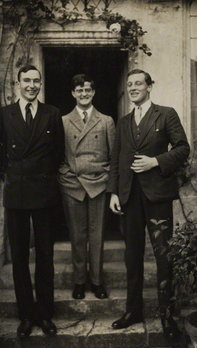

Queer Places:
University of Oxford, Oxford, Oxfordshire OX1 3PA
Campdowns Cemetery St Austell, Cornwall Unitary Authority, Cornwall, England
 Alfred
Leslie Rowse CH FRSL FBA FRHistS (4 December 1903 – 3 October 1997) was a
British author and historian from Cornwall. In his cultural history of male
homosexuality, A.L. Rowse wrote: ‘There is something we can blame
Oscar Wilde for: for having
brought down upon himself the vindictiveness of philistines and allowing them
to triumph. Thousands suffered unspeakably on account of his Irish
irresponsibility and exhibitionism.’
Alfred
Leslie Rowse CH FRSL FBA FRHistS (4 December 1903 – 3 October 1997) was a
British author and historian from Cornwall. In his cultural history of male
homosexuality, A.L. Rowse wrote: ‘There is something we can blame
Oscar Wilde for: for having
brought down upon himself the vindictiveness of philistines and allowing them
to triumph. Thousands suffered unspeakably on account of his Irish
irresponsibility and exhibitionism.’
Rowse is best known for his work on Elizabethan England and his poetry about Cornwall. He was also a Shakespearean scholar and biographer.
Rowse was born at Tregonissey, near St Austell, Cornwall, the son of Annie (née Vanson) and Richard Rowse, a china clay worker. Despite his parents being poor and having little formal education, he won a place at St Austell County Grammar School and then a scholarship to Christ Church, Oxford in 1921. He was encouraged in his pursuit of an academic career by a fellow Cornish man of letters, Sir Arthur Quiller-Couch, of Polperro, who recognised his ability from an early age. Rowse endured doubting comments about his paternity, thus he paid particular attention to his mother's association with a local farmer and butcher from Polgooth, near St Austell, Frederick William May (1872–1953).[1] Any such frustrations were channelled into academia, which reaped him dividends later in life.
Rowse had planned to study English literature, having developed an early love of poetry, but was persuaded to read history. He was a popular undergraduate and made many friendships that lasted for life. He graduated with first class honours in 1925 and was elected a fellow of All Souls College the same year. In 1929, he proceeded to a Master of Arts degree. In 1927 he was appointed lecturer at Merton College, where he stayed until 1930. He then became a lecturer at the London School of Economics.
In 1931, Rowse contested the parliamentary seat of Penryn and Falmouth for the Labour Party, but was unsuccessful, finishing third behind a Liberal. In the general election of 1935 he again stood unsuccessfully, but managed to finish in second place, ahead of the Liberal. In both the 1931 and 1935 elections, Maurice Petherick was returned as a Conservative MP to Parliament, albeit with a minority of the vote. Rowse supported calls made by the likes of Sir Stafford Cripps for a "Popular Front (UK), who was expelled from office for his views. Rowse worked to get agreement by Labour and Liberal parties in Devon and Cornwall, making a common cause with the Liberal MP Sir Richard Acland. A general election was expected to take place in 1939, and Rowse, who was again Labour's candidate for Penryn & Falmouth, was not expected to have a Liberal opponent. That would increase his chances of winning. But, due to outbreak of war, the election did not take place and his career was effectively ended.
Undeterred, Rowse chose to continue his career by seeking administrative positions at Oxford becoming Sub-Warden of All Souls College. In 1952, he failed in his candidacy for election as Warden against John Sparrow. Shortly afterwards he began what became regular trips to The Huntington Library in Southern California, where for many years he was a senior research fellow. He received a doctorate (DLitt) from Oxford University in 1953. After delivering the British Academy's 1957 Raleigh Lecture on history about Sir Richard Grenville's place in English history, Rowse was selected as a fellow of the academy (FBA) in 1958.
Rowse published about 100 books. By the mid-20th century, he was a celebrated author and much-travelled lecturer, especially in the United States. He also published many popular articles in newspapers and magazines in Great Britain and the United States. His brilliance was widely recognised. His knack for the sensational, as well as his academic boldness (which some considered to be irresponsible carelessness), sustained his reputation. His opinions on rival popular historians, such as Hugh Trevor-Roper and A. J. P. Taylor, were expressed sometimes in very ripe terms.
In his later years, Rowse moved increasingly towards the political right, and many considered him to be part of the Tory tradition by the time he died. One of Rowse's lifelong themes in his books and articles was his condemnation of the National Government's policy of appeasement of Nazi Germany in the 1930s, and the economic and political consequences for Great Britain of fighting a second war with Germany. Another was his horror at the degradation of standards in modern society. He is reported as saying: "...this filthy twentieth century. I hate its guts".
Despite international academic success, Rowse remained proud of his Cornish roots. He retired from Oxford in 1973 to Trenarren House, his Cornish home, from where he remained active as writer, reviewer and conversationalist until immobilised by a stroke the year before his death. His ashes are buried in the Campdowns Cemetery, Charlestown near St Austell.
My published books: